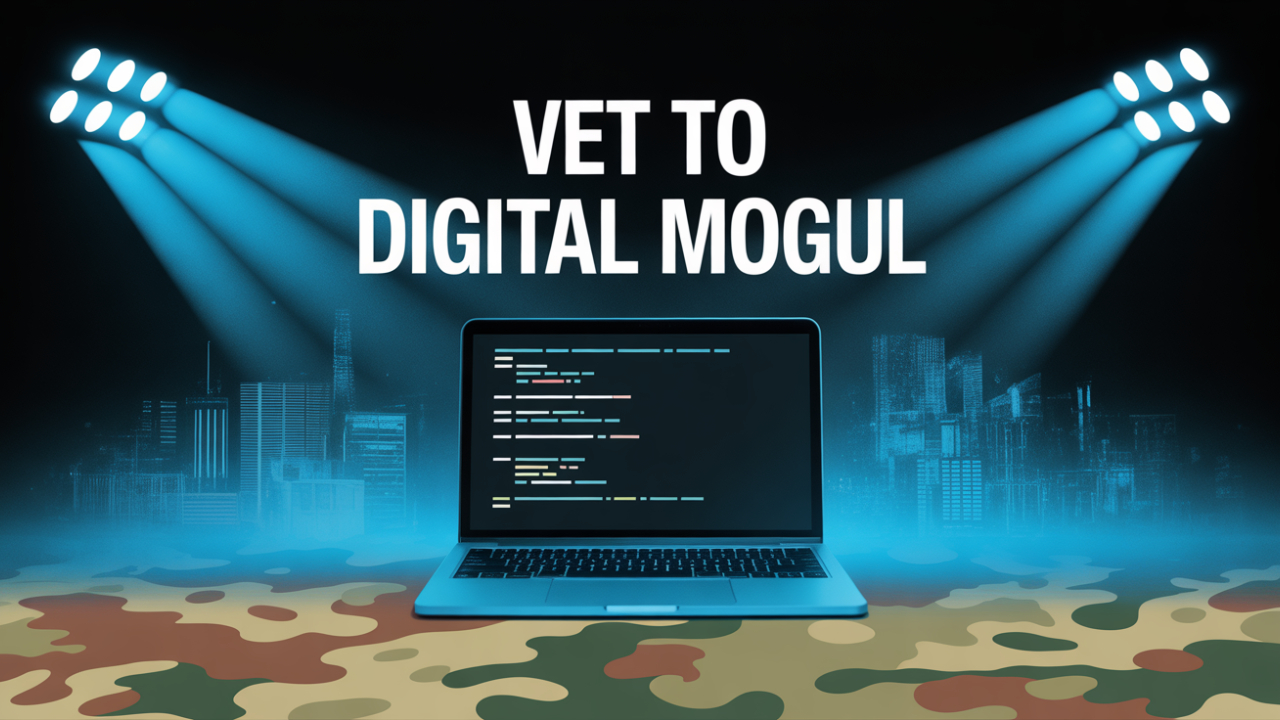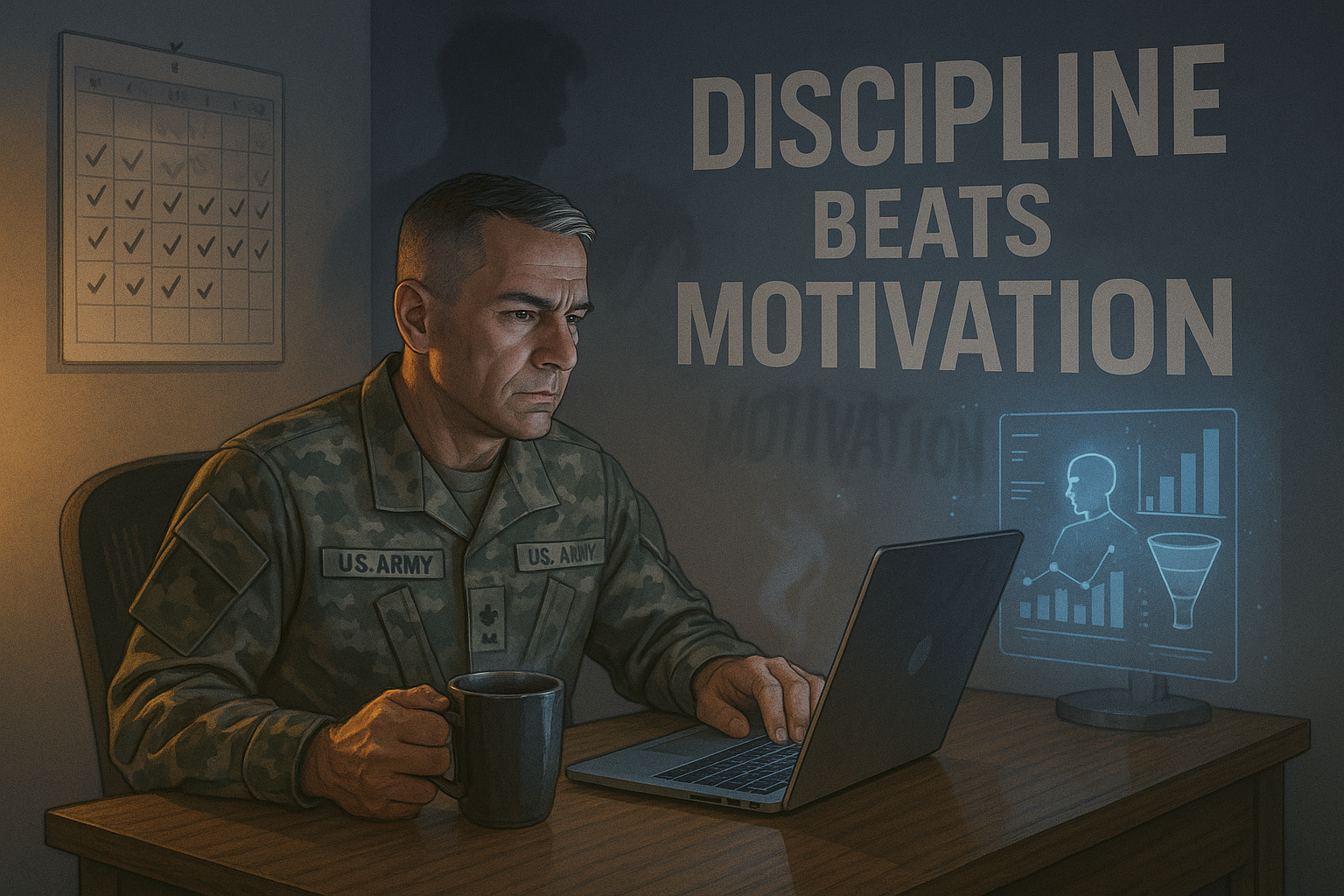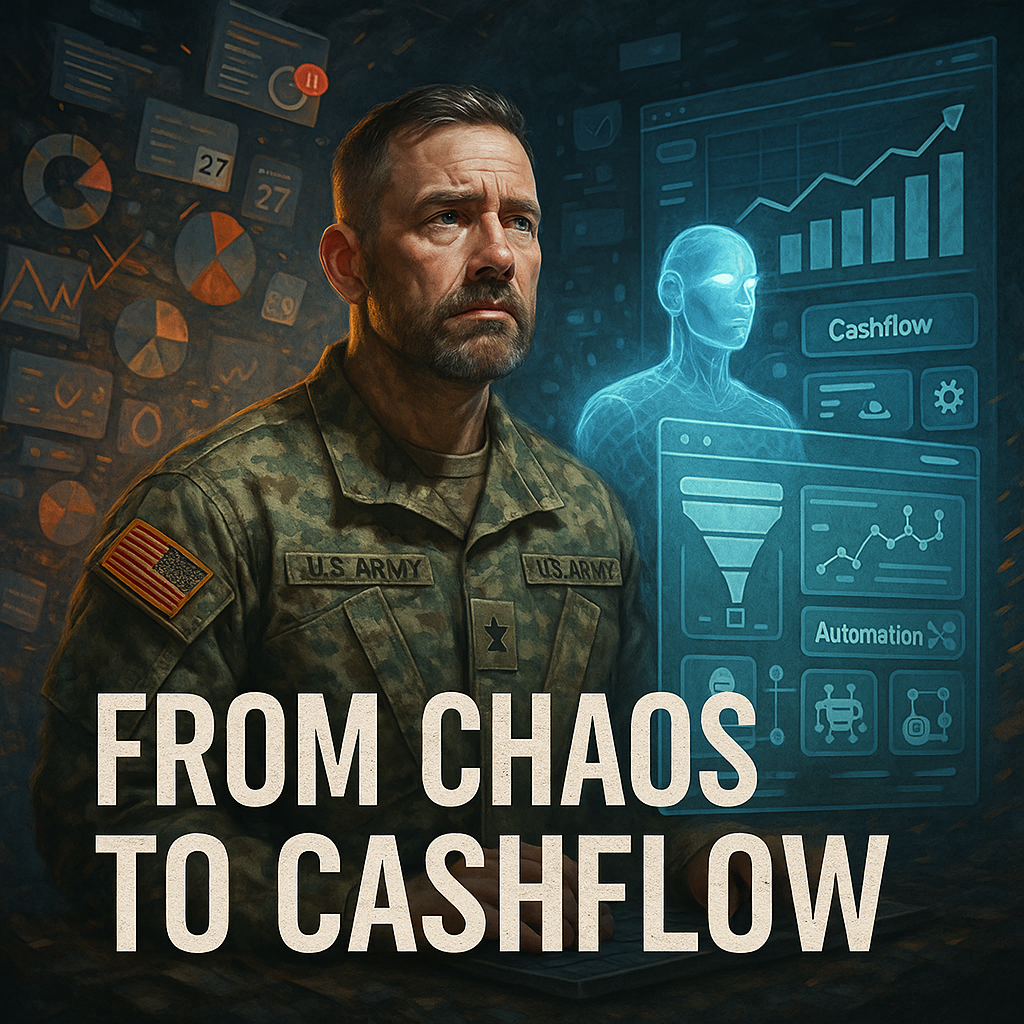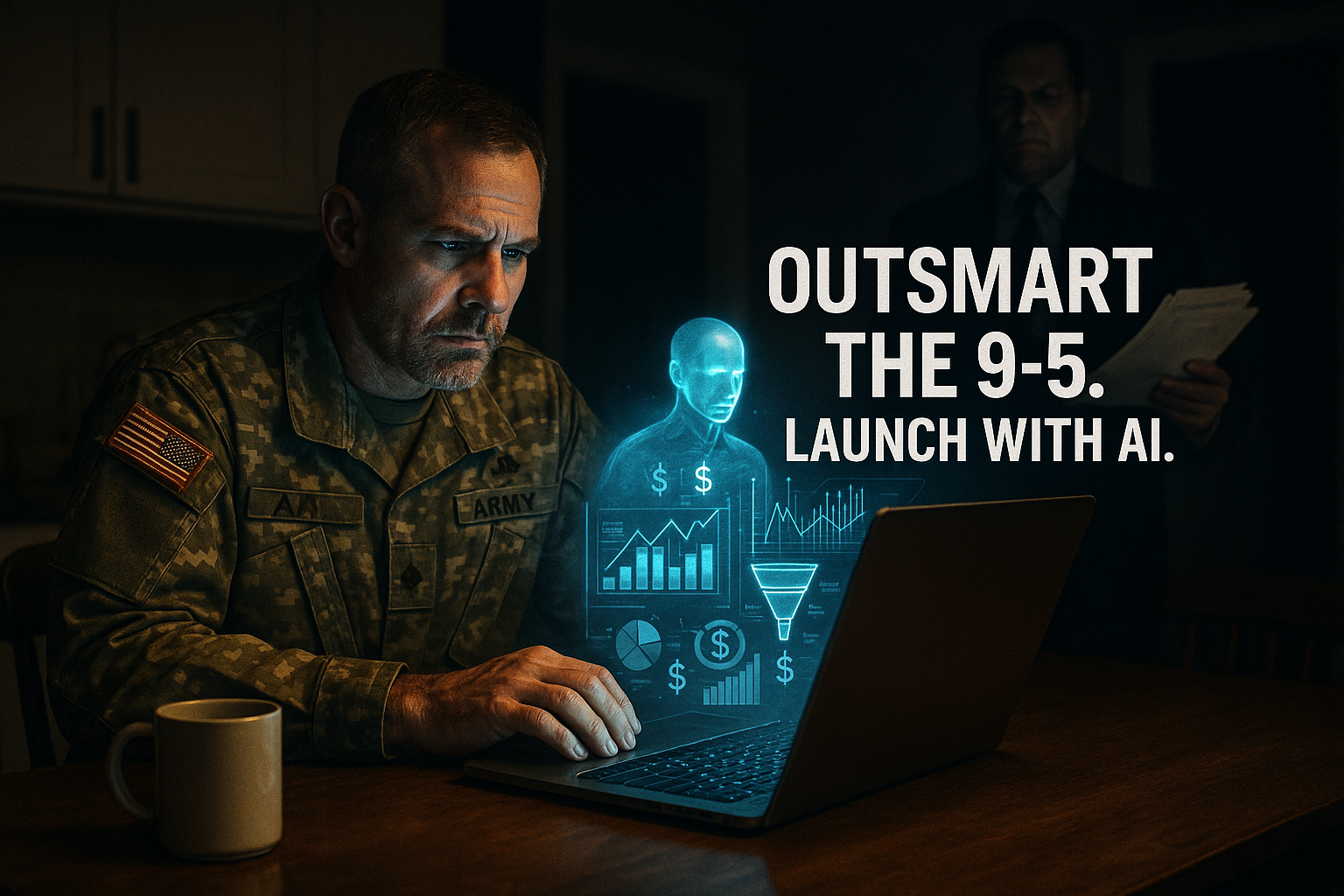Did you ever imagine that your discipline honed in the military could be your ticket to a booming career in artificial intelligence? Picture this: you’re hanging up your boots, blending your grit with smart tech, and building a future bursting with possibility. We’ll unpack how veterans can transition into dynamic, remote AI jobs—from training AI to managing digital marketing campaigns—and kick off a journey that’s equal parts purposeful, profitable, and flexible. Ready to be the commander of your own digital future? Let’s dive in!
Taking Stock: Why Military Skills Are In Demand in AI Roles
Let me tell you something that might surprise you—your military background isn't just valuable in traditional security or government roles. The AI industry is actively seeking veterans, and the reason goes far beyond patriotic hiring practices. Research shows that transitioning military skills to business environments, particularly in AI, creates a natural fit that employers are eager to tap into.
The Adaptability Factor: Your Secret Weapon
Military training doesn't just teach you to follow orders—it molds you into someone who can pivot quickly when situations change. In AI roles, this adaptability becomes your superpower. While civilian colleagues might struggle when an AI system throws unexpected errors or when client requirements shift mid-project, you're already thinking three steps ahead. This flexibility makes you perfect for remote-friendly AI careers where change is the only constant.
Think about it: how many times did you have to adjust your approach in the field when intelligence changed or equipment failed? That same mental agility translates beautifully to troubleshooting AI systems, managing customer queries, or adapting to new software updates that seem to roll out weekly in the tech world.
Communication Under Pressure: A Rare Commodity
Here's what civilian employers struggle to find—people who can communicate clearly when things get chaotic. Your military experience gave you something that can't be taught in a weekend workshop: the ability to stay calm and articulate when pressure mounts. In AI customer service roles, this skill becomes invaluable when frustrated clients need complex technical issues explained in simple terms.
I recently spoke with Mark, a former Army squad leader who now leads an AI customer support team. He told me, "The difference is night and day. When our AI platform crashed during peak hours, my team looked to me for direction. My military background kicked in—assess, communicate, execute. We had customers back online faster than our competitors could even acknowledge the problem."
The Leadership Edge in Remote Work
Leadership in the military isn't about titles—it's about taking responsibility and ensuring mission success. This mindset sets you apart in remote digital workplaces where self-motivation often separates the successful from the struggling. Studies indicate that over 64% of employers value military experience in remote tech roles, and it's not hard to see why.
Your punctuality isn't just about showing up on time for video calls (though that matters too). It's about understanding that deadlines aren't suggestions, that your teammates depend on you, and that quality work doesn't happen by accident. These aren't just nice-to-have qualities—they're essential for online AI jobs for veterans where managers can't look over your shoulder.
Discipline: The Foundation of Consistent Output
Let's talk about something that might seem mundane but is actually revolutionary in remote work—your ability to deliver consistent, reliable output. In AI data annotation roles, for example, accuracy isn't negotiable. Every mislabeled image or incorrectly categorized text affects the entire system's performance. Your military discipline provides the foundation for this kind of meticulous, autonomous work.
"Veterans understand focus under pressure—perfect for AI customer support," says Rachel Kim, a tech manager who has hired dozens of veterans for AI roles.
This consistency extends beyond individual tasks. When you commit to a project timeline, you deliver. When you say you'll be available for a client call, you're there. This reliability becomes a competitive advantage in environments where many remote workers struggle with self-management.
The Mission-First Mindset
Your military experience instilled something powerful: understanding that individual success means nothing if the mission fails. This translates perfectly to AI team environments where your work directly impacts system performance and customer satisfaction. You're not just completing tasks—you're contributing to a larger objective.
The transition to AI work isn't primarily about learning new technical skills initially. It's about leveraging your existing mindset and reliability in a new environment. Research shows that the average transition time for veterans to new remote fields is 4-8 months, and much of that time is spent on technical training rather than developing work habits.
What makes this particularly exciting is that high demand exists—10% of AI remote job postings specifically seek
Cracking Open the AI Toolbox: Roles Veterans Can Thrive In
You know what's fascinating? The same skills that made you invaluable in the military are exactly what employers are desperately seeking in the AI industry. I'm talking about your ability to stay calm under pressure, follow detailed protocols, and communicate clearly when stakes are high. These aren't just nice-to-have qualities—they're the foundation of success in today's hottest AI career paths.
Let me paint you a picture. Remember those mission briefings where every detail mattered? Where one miscommunication could derail everything? That's essentially what you'll be doing in AI—except instead of briefing a commander, you're training the next generation of artificial intelligence to understand and serve real people.
AI Customer Service Roles: Your Communication Skills Pay Off
Here's where your military experience becomes pure gold. AI customer service roles aren't just about answering phones anymore. You're actually working alongside AI systems, helping them understand customer needs while stepping in when human judgment is required. Think of it as being a translator between frustrated customers and digital solutions.
The beauty of these positions? They're perfect for remote work, and research shows that veterans consistently outperform other candidates because of their natural empathy and ability to de-escalate situations. Plus, with pay ranges hitting $18-$50 per hour according to Indeed's 2024 data, you're looking at solid income potential right from the start.
Picture this: instead of managing personnel conflicts, you're helping AI chatbots understand when a customer's "urgent" request really means "I'm having a bad day and need someone to listen." Your military training in reading between the lines? That's your secret weapon.
AI Training Data Annotation Jobs: Detail Work That Actually Matters
Remember how crucial accuracy was in your military role? Every form, every report, every detail had to be perfect because lives depended on it. Well, AI training data annotation jobs require that same meticulous attention to detail—and the stakes are equally high.
Data annotation is accessible, flexible, and requires many qualities veterans already possess. You're essentially teaching AI systems to recognize patterns, understand context, and make decisions. It's like creating the ultimate standard operating procedure, but for machines instead of soldiers.
James Carter, a USMC veteran who made the switch, puts it perfectly:
"I swapped an MRE for an AI data set and never looked back."He's now earning steady income while working from his home office, using the same precision mindset that served him in the Marines.
Digital Marketing with AI Tools: Mission-Driven Results
This is where things get really exciting. Digital marketing with AI tools is a fast-growing remote income stream for transitioning veterans, and here's why you're naturally suited for it: marketing is essentially mission planning with a different objective.
Instead of coordinating tactical operations, you're orchestrating AI-powered campaigns. Those analytical skills you used to assess battlefield conditions? Now you're analyzing customer behavior patterns. The strategic thinking that helped you complete missions? That's exactly what drives successful AI-enhanced marketing campaigns.
AI digital marketing tools like chatbots, analytics platforms, and campaign managers open entrepreneurial doors that simply didn't exist a few years ago. You can literally start your own marketing consultancy from your laptop, using AI to deliver results that would have required entire teams in the past.
Beyond the Obvious: Quality Assurance and Workflow Optimization
Here's something most people don't realize—roles requiring quick analysis, such as AI quality assurance or workflow optimization, are absolutely perfect for veterans. You're used to spotting problems before they become disasters, right? That's exactly what AI quality assurance involves.
Quality assurance in AI prioritizes detail-driven, process-oriented workers—and honestly, that's a veteran sweet spot. You understand the importance of testing systems, documenting processes, and ensuring everything works as intended before it goes live.
Take Sarah, a Navy veteran who transitioned from aviation tech to digital content management with AI tools. She describes her new role like this: "Picture briefing a commander—now it's AI's turn to listen to your data
From Barracks to Backend: Leveling Up With Simple Steps
Listen, I get it. You've mastered complex military systems, led teams under pressure, and adapted to situations that would make most civilians break out in a cold sweat. But now you're staring at job boards filled with tech jargon, wondering how your military experience translates to the digital world. Here's the thing – you're already ahead of the game, you just need to connect the dots.
Your Military Skills Are Digital Gold
Before diving into online AI jobs for veterans, let's talk about what you already bring to the table. That systematic approach to problem-solving? That's exactly what AI companies need. Your ability to follow protocols while thinking on your feet? Perfect for managing AI systems that require both precision and adaptability.
Research shows that remote AI job onboarding is accessible with as little as two weeks of training – and that's because companies recognize the value of military discipline and training. Start by listing your strongest military skills: project management, logistics coordination, data analysis, or technical troubleshooting. These aren't just military skills – they're the foundation of successful AI careers.
Speaking the Digital Language
Your resume needs a complete overhaul, but not in the way you think. Instead of translating "managed supply chain logistics" into corporate speak, focus on results and keywords that AI companies actually search for. Did you manage data? Optimize processes? Coordinate remote teams? These experiences directly translate to AI operations.
Studies indicate that veterans see 70% faster hiring with tailored LinkedIn profiles, and online portfolios can double interview callbacks. The key is understanding that remote work for veterans isn't just about working from home – it's about communicating your value through digital channels first.
Your Training Ground: Online Platforms Built for Success
Here's where things get exciting. Platforms like OpenLegionAI and SkillBridge aren't just job boards – they're your training grounds for veteran entrepreneurship online. OpenLegionAI's AI Freedom Launchpad specifically features resources for transitioning service members, while SkillBridge partners place over 15,000 transitioning veterans per year in tech internships.
But don't stop there. Several e-learning hubs now offer 'AI for Beginners' courses, many free for veterans. YouTube, Coursera, and Udemy have become the new boot camps for digital skills. The beauty? You can learn at your own pace, on your own schedule.
Quick-Start Training That Actually Works
Forget the idea that you need years of training to break into AI. The industry moves fast, and companies value practical skills over lengthy degrees. Start with AI customer service roles – they're entry-level but teach you how AI systems interact with humans. Move into AI training data annotation, where your attention to detail becomes your superpower.
Here's what Miguel Torres, Army veteran and digital marketer, told me:
"I filled out my old logbooks; now I keep digital dashboards running 24/7."That transition from analog to digital isn't as big as it seems when you break it down into manageable steps.
Digital Etiquette: Your New Rules of Engagement
Remote work demands a different kind of communication discipline. In the military, you learned to be clear, concise, and actionable. In remote AI work, you need to over-communicate – but strategically. Update your team proactively. Document your processes. Ask questions early rather than struggling in silence.
Think of it this way: in the field, you checked in with your team regularly for safety and mission success. Remote work requires the same discipline, just through Slack messages and video calls instead of radio checks.
Building Your Digital Battle Buddy Network
The military taught you that you're only as strong as your team. The same applies to breaking into AI. Personal branding and networking remain critical for breaking into the AI industry as a veteran, but your network looks different now.
Connect with veteran tech forums and mentors. Remote work is tech-friendly but
Wild Cards: Surprising Ways AI Can Empower Former Service Members
Who said your path from military service to AI success had to follow a straight line? Sometimes the most rewarding opportunities come from the unexpected routes—the ones that let you combine your unique military background with cutting-edge technology in ways that might surprise you.
I've seen countless veterans discover that their greatest strength isn't just adapting to AI customer service roles or traditional remote work for veterans. It's about creating entirely new opportunities that didn't exist before. Let me share some unconventional paths that are changing the game for service members ready to embrace the AI revolution.
Launch Your AI-Powered Business Empire
Think about it—who better than a veteran to manage the logistics of smart web shops or automated services? Your experience with complex systems and attention to detail makes you perfect for AI-powered entrepreneurship. Research shows a 15% year-over-year growth in veteran-owned AI tech businesses, and there's a reason for that surge.
You could start by managing automated customer service systems for small businesses, or create AI-driven inventory management solutions. The beauty is that these businesses often require minimal upfront investment but leverage your natural ability to understand interconnected systems. Your military training already taught you to think systematically—now you're just applying that to smart technology.
Become the AI Coach Everyone Needs
Here's where transitioning military skills to business gets really interesting. Organizations everywhere are struggling to understand AI, and they need someone who can break it down in terms they understand. Your "brief-and-debrief" military communication style? That's pure gold in the AI coaching world.
Companies are hungry for leaders who can translate complex AI concepts into actionable strategies. You've already mastered the art of taking complicated orders and making them crystal clear for your team. Now you're doing the same thing with artificial intelligence. The demand for AI coaches is exploding, and your military background gives you instant credibility.
"Teaching AI to understand call signs was the best post-service icebreaker I've found." – Tanya Rhodes, Air Force vet & AI coach
Lead the Veteran AI Revolution
Want to make a real impact? Focus on mentoring fellow veterans in AI literacy. Studies indicate that workshops led by veterans achieve up to 43% higher engagement rates compared to civilian-led sessions. There's something powerful about peer-to-peer mentorship in the AI space that accelerates veteran adaptation and job satisfaction.
You could develop specialized AI tools for disabled service members, or create workshops that specifically address the unique challenges veterans face when entering the tech world. The veteran community trusts other veterans, and your voice carries weight when you're advocating for AI literacy among your brothers and sisters in arms.
Champion Digital Advocacy
Your leadership skills don't have to retire when you do. Digital advocacy offers a perfect platform to campaign for inclusive tech hiring practices. Many companies talk about hiring veterans, but they don't always know how to recognize the value of military experience in AI-related roles.
You could become the bridge between the veteran community and tech companies, helping organizations understand why former service members excel at AI customer service roles and other tech positions. Your advocacy work could shape hiring policies and create more opportunities for veterans across the industry.
The Fun Side: Teaching AI Military Culture
Here's a playful twist that's gaining traction—training AI systems to understand military slang and culture. It might sound silly, but it's actually valuable work. Companies serving military clients need AI systems that can properly interpret military language and context.
Imagine creating an AI that actually understands what "hurry up and wait" means, or can properly interpret the nuances of military communication. This niche specialization combines your cultural knowledge with technical skills in a way that's both enjoyable and profitable.
Building Your Unique AI Path
The thread connecting all these opportunities is your ability to bridge technology with human connection. Veterans excel at this because military service teaches you to work with diverse teams, communicate clearly under pressure, and adapt to rapidly changing situations.
Veteran-led tech startups in AI and digital services are rising, fueled by community support and unique leadership insights. You're not just finding remote work for veterans—you're creating
Conclusion: Charting Your New Mission—Why the Next Call Sign Is Your Own
Here's what I've learned after talking to hundreds of veterans who've made the jump into online AI jobs for veterans—the hardest part isn't learning the technology. It's believing you deserve this chance at a new beginning.
Your discipline and drive transfer seamlessly to remote AI fields. That attention to detail that kept your squad safe? It's exactly what employers need for AI training data annotation. The leadership skills you developed managing teams under pressure? They're gold in AI project management roles. The problem-solving mindset that got you through impossible situations? It's the foundation every successful AI entrepreneur builds upon.
Think about it this way—in the military, you followed orders and completed missions. In the AI world, you get to write your own mission statement. As Eric Lewis, a veteran turned tech entrepreneur, puts it:
'In the military, I followed a mission; in AI, I set my path.'That shift from following to leading your own destiny? It's both terrifying and exhilarating.
The beautiful thing about remote-friendly AI careers is that geography doesn't matter anymore. Whether you're in rural Montana or downtown Detroit, the same opportunities are available. Online work removes the barrier of location, putting global markets within reach of every veteran. You're not limited by what's available in your immediate area—you're competing in a worldwide marketplace where your military experience actually gives you an edge.
I see veterans nationwide scripting brand-new success stories every single day. There's Sarah, who went from Army logistics to managing AI customer service systems for a Fortune 500 company. There's Mike, who turned his military communications experience into a thriving digital marketing consultancy using AI tools. These aren't unicorn stories—they're becoming the norm.
Research shows that veteran-focused AI communities accelerate both skill-building and career placement. The camaraderie and mentorship that fuel success in these communities remind me of the bonds formed in service. You're not going it alone—there's a whole network of veterans who understand exactly what you're going through.
Here's what might surprise you: you don't need to become a tech wizard to get started. The AI skills shortage projected to last through at least 2030 means companies need people who can think critically, communicate clearly, and solve problems systematically. Sound familiar? That's military training talking.
The growth in online veteran mentorship groups—up over 20% in 2023 alone—tells me something important. We're recognizing that the transition into AI work is a journey, and every skill from your service can find a new home online. AI's remote nature is especially compatible with the values and needs of former service members who want flexibility without sacrificing purpose.
What's stopping you from taking that first step? If it's fear of the unknown, remember—you've navigated uncertainty before. If it's imposter syndrome, know that your military experience gives you advantages that civilian candidates don't have. If it's not knowing where to start, that's what platforms like OpenLegionAI are for—they lower the entry barriers for veterans eager to move into AI.
The paths ahead are numerous. Maybe you'll land a steady remote AI job that gives you the stability and benefits you're looking for. Perhaps you'll discover veteran entrepreneurship online is your calling, building something from scratch that serves other veterans. Or maybe you'll become an advocate, helping other service members navigate this transition.
Whatever path you choose, know this: your next call sign is your own. You get to decide what success looks like. You get to choose which missions matter. You get to build the career that serves your life, not the other way around.
Ready to transition? The time is now. Start with the resources at OpenLegionAI and beyond. Join digital veteran communities where you'll find camaraderie, share tips, and boost confidence. Connect with other veterans who've made this journey and are eager to help you succeed.
Your service prepared you for this moment. Your discipline, adaptability, and commitment to excellence are exactly what the AI industry needs. The only question left is: are you ready to claim your digital destiny?
Take action today. Visit OpenLegionAI, explore the opportunities waiting for you, and take the
TL;DR: Veterans can unlock flexible, lucrative AI jobs from home—like data annotation, customer service, and digital marketing—by leveraging their military skills, discipline, and problem-solving mindsets. Start your transition with actionable tips and inspiring stories to kick off your success online.



